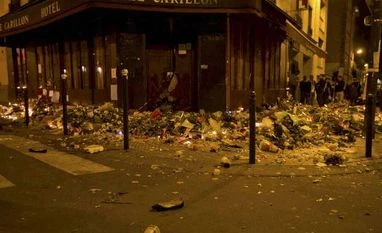The late-night assault on Friday in the French capital, which killed 129 people, also sent the euro tumbling on fears for security in Europe and its effect on the already struggling eurozone economy.
It added to uncertainty in already nervous markets, which ended last week on a low owing to increasing worries about the state of the global economy.
While losses rippled across Asian stock markets, airlines were among the worst hit.
Japan Airlines sank almost 3% and rival ANA was 3.5% off, while in Sydney Virgin Australia plunged 6.5%. Indonesian flag carrier Garuda fell 1.3%.
In Shanghai there was big selling in China Eastern Airlines, Air China and China Southern Airlines, while tourist firms also retreated, with China CYTS Tours Holding and China International Travel Service each down more than 1%.
"There will definitely be a negative psychological impact in the short term in tourism-related sectors. Airlines are particularly affected," Zhang Qi, a Shanghai-based analyst with Haitong Securities, told Bloomberg News. The situation in France is "still quite uncertain now, so investors seem to be broadly risk-off today."
Regional stock indexes were also mostly lower, with Hong Kong 1.6% off in the afternoon, while Tokyo fell more than one% and Sydney gave up 0.9%.
"There is no doubt that the attacks in Paris will contribute to short-term investor nervousness," Shane Oliver, Sydney-based strategist at AMP Capital Investors, said.
However, he said he expected the Paris-linked losses to be brief and pointed out that markets had bounced back from initial selling following past terror attacks.
Selling also hit the euro, which was already under pressure from expectations the European Central Bank will loosen monetary policy to shore up the eurozone. High-risk emerging market currencies such as the South Korean won and Indonesian rupiah also fell as investors looked for safer bets such as the dollar and yen.
You’ve reached your limit of {{free_limit}} free articles this month.
Subscribe now for unlimited access.
Already subscribed? Log in
Subscribe to read the full story →

Smart Quarterly
₹900
3 Months
₹300/Month
Smart Essential
₹2,700
1 Year
₹225/Month
Super Saver
₹3,900
2 Years
₹162/Month
Renews automatically, cancel anytime
Here’s what’s included in our digital subscription plans
Exclusive premium stories online
Over 30 premium stories daily, handpicked by our editors


Complimentary Access to The New York Times
News, Games, Cooking, Audio, Wirecutter & The Athletic
Business Standard Epaper
Digital replica of our daily newspaper — with options to read, save, and share


Curated Newsletters
Insights on markets, finance, politics, tech, and more delivered to your inbox
Market Analysis & Investment Insights
In-depth market analysis & insights with access to The Smart Investor


Archives
Repository of articles and publications dating back to 1997
Ad-free Reading
Uninterrupted reading experience with no advertisements


Seamless Access Across All Devices
Access Business Standard across devices — mobile, tablet, or PC, via web or app



)


